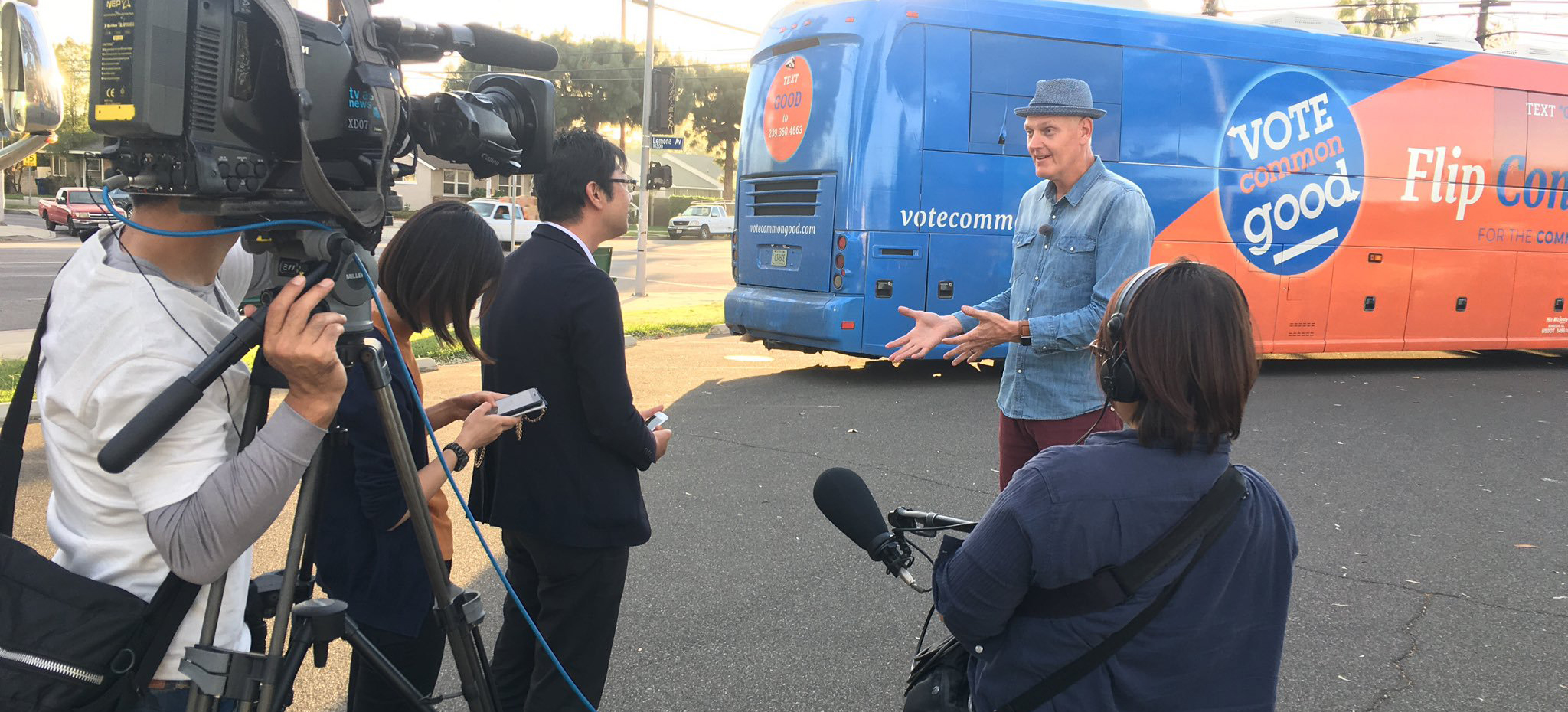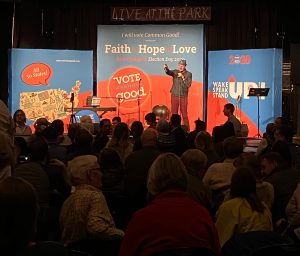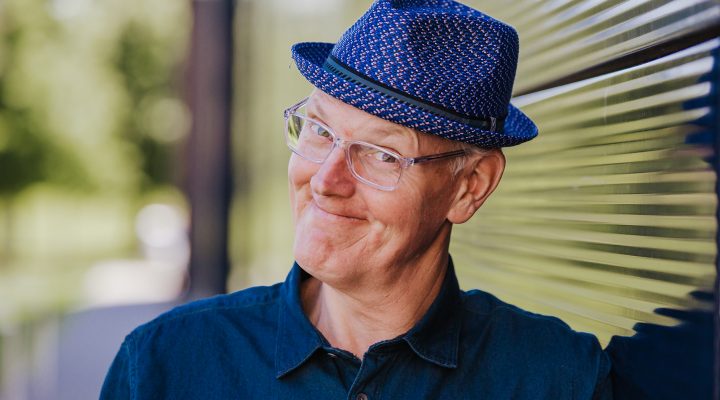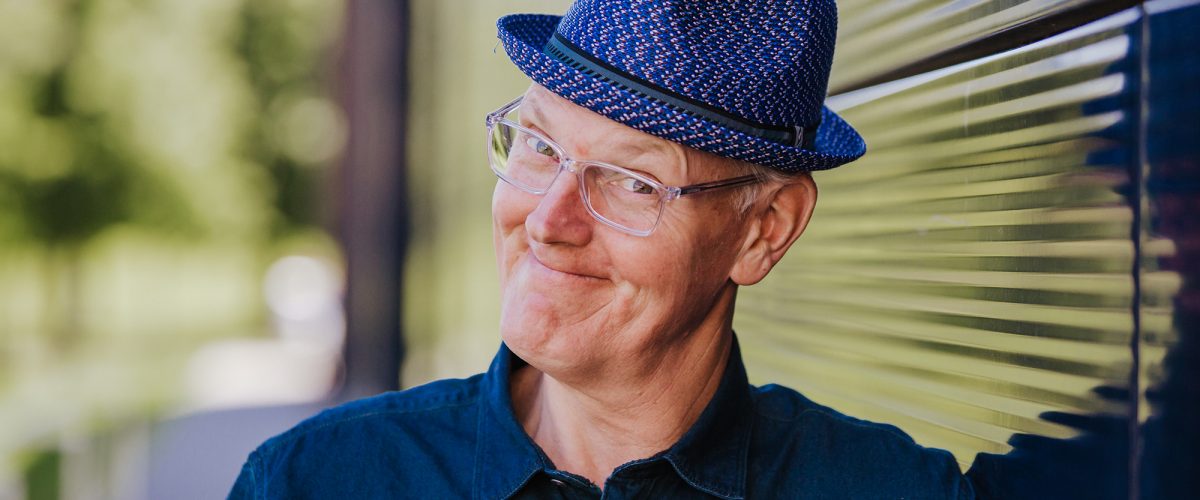Politics always was secondary for Doug Pagitt, who spent three decades serving as a pastor in Minnesota. He served at Wooddale Church under Leith Anderson, president of the National of Association of Evangelicals, and later founded Solomon’s Porch, an innovative church in Minneapolis.
After his one unsuccessful campaign for a seat in the Minnesota Legislature, Pagitt never ran again.
But priorities shifted after Donald Trump was elected president in 2016 with the help of his fellow evangelicals. Pagitt calls that election a “clarity moment” that led to his new calling.
“The Donald Trump election crime scene has evangelical fingerprints all over it.”
“The Donald Trump election crime scene has evangelical fingerprints all over it,” Pagitt said in a recent interview with BNG.
A progressive Christian who traded the pulpit for politics, Pagitt founded Vote Common Good in 2018 as a non-partisan political nonprofit “dedicated to inspiring, energizing and mobilizing people of faith to engage in civic life.”
He opposed Trump not because Trump is a Republican, but because he’s convinced Trump is a hazard to much that American citizens and evangelical believers hold dear.
“Many evangelical and Catholic voters have been taught that to be faithful, they must vote for Republican candidates regardless of the candidate’s character or policy positions,” says a Vote Common Good explainer. “Many evangelical and Catholic voters are experiencing a reckoning of their faith and feel called to oppose policies and approaches of division, racism, selfishness, cruelty and exclusion.”

Doug Pagitt being interviewed
Pagitt envisions people whose religious and political identities are held together with thought and by choice, not by “edict.”
His group’s vision of the common good contrasts it with selfish or partisan motives and cites Jewish, Christian and Muslim Scriptures.
A spiritual descendant of an earlier generation of thinkers on the “religious left” that included Jim Wallis, Tony Campolo and Ron Sider, Pagittt uses 30-city bus tours, cross-country bike rides across the nation’s southern border, and just about anything else he can think of to gain an audience and “flip the script” on believers’ growing nationalism and deepening loyalty to Trump.
 Audience members often say they’ve never heard people of faith talk to them about voting according to their values rather than partisan loyalties.
Audience members often say they’ve never heard people of faith talk to them about voting according to their values rather than partisan loyalties.
As one woman who drove 70 miles to attend a Vote Common Good event explained, “We own a hardware store in my hometown, and if anybody knew I was here, they wouldn’t come to our hardware store anymore.”
With the 2024 elections less than 11 months away, Vote Common Good is focusing on the five swing states that likely will decide the race. Padgett believes victory is in sight.
“Our little bus tours are a small, cheap, homemade version of Franklin Graham’s big bus tours that crisscross the country every election year,” Pagitt said. “Their tours cost a lot more because they need to keep tens of millions of people” on the Trump train, “while all we need to do is move a few people out” of Trump’s base of evangelical supporters.
Pagittt estimates a swing of 20,000 to 30,000 voters in five key swing states — Arizona, Georgia, Michigan, Pennsylvania and Wisconsin — might be enough to make sure Trump doesn’t return to the White House for what Trump calls a “vengeance” term that will see him using his office to persecute and prosecute his enemies.
“The number is so small it could be a rounding error, or the margin of error in polls,” Pagitt explained.
“We want people of all political parties to vote against Donald Trump on election day.”
“We are engaging with faith voters who swung from Trump to Biden in 2020,” said Vote Common Good in a Dec. 5 email, “and we are working to recruit more for 2024.”
Pagittt, who worked on the 2008 campaign for Barak Obama, witnessed a surprising number of evangelicals vote for Obama in 2008 and 2012. But while Obama and his entire team actively sought evangelical support, in 2016 Hillary Clinton shooed them away, nearly forever,” based on the false belief that she didn’t need them to beat Trump.
He’s working to make sure Democrats don’t defeat themselves again in 2024. One tactic is something The New Yorker called “Teaching Democrats to Speak Evangelical.”
And if that sounds partisan, Pagittt claims it’s not. “We want people of all political parties to vote against Donald Trump on election day.”
Vote Common Good doesn’t endorse candidates. It supports candidates who endorse its “Six Commitments:”
- Leading by example
- Showing uncommon curiosity
- Communicating clearly
- Exhibiting courtesy and decency
- Speaking with fairness and balance
- Demonstrating persistence in seeking the common good
And unlike most conservative evangelical political groups, Vote Common Good works with all three of America’s largest voting blocs: Democrats, Republicans and independents.
The group had a budget of $2 million in 2022, when a slate of more than 100 candidates at various levels embraced its principles, including John Fetterman, the lanky, sweatshirt-wearing senator from Pennsylvania. In a key 2022 Senate race, Fetterman beat Trump-endorsed candidate Mehmet Oz 51% to 46%.
Pagitt predicts Vote Common Good will work with more than 300 candidates in the 2024 election cycle. Among them is Adam Frisch, a Democrat who challenged Colorado Rep. Lauren Boebert in 2022, but lost the race by 538 votes. He is challenging Boebert again in 2024.
Vote Common Good also expects to gain a hearing among evangelical voters turned off by post-Roe v Wade red-state abortion legislation that threatens women’s access to health care.
Related articles:
GOP abortion laws are wildly out of step with many evangelicals’ convictions
Ronald Reagan, the Strict Father and American conservatism | Analysis by Rodney Kennedy
A call for immoderate mediators: David Gushee defends democracy from its Christian enemies | Analysis by Alan Bean


